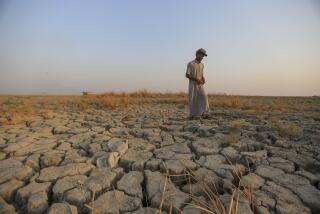Iraq to Increase Its Oil Output
- Share via
Iraq, the fifth-largest oil producer in the Middle East, will spend more than $1 billion next year to increase production capacity by about 15% to 3.25 million barrels a day, an Iraqi official said.
“The budget is fixed for priority projects to build new export pipelines and complete modifications to our refineries,” Abdulilah Amir, a foreign relations advisor to Iraqi Oil Minister Thamir Ghadhban, said in a telephone interview Sunday.
Iraq, which holds oil reserves estimated by the Arab Oil and Gas Directory to be the third-largest in the Middle East at about 112.5 billion barrels, can produce as many as 2.8 million barrels a day of oil at full capacity, Amir said from Baghdad.
Iraq’s plans to increase capacity to 3 million barrels a day this year were curtailed by persistent attacks by militants against foreign contractors and pipelines. The U.S.-government funded Restore Iraqi Oil program returned output to prewar levels of more than 2 million barrels a day this year after last year’s invasion led to a production collapse.
Some of the world’s largest oil companies, including Exxon Mobil Corp., Royal Dutch/Shell Group and ChevronTexaco Corp., are intent on bidding to develop Iraq’s oil resources should the government decide to open up the industry to foreign investment after elections next year.
Oil exports rose to almost 2.3 million barrels a day in October, according to the Organization of the Petroleum Exporting Countries. Iraqi officials said shipments from the Basra oil terminal were halved last week because of equipment-corrosion problems.
Basra and Iraq’s southern provinces, which have escaped most of the security problems that have crippled the industry in the north, are its most fertile areas for oil production and exports.
State-run South Oil Co., formed in 1968, claims to account for about 2 million barrels a day of the country’s total output capacity pumped from 813 wells, spread across 12 fields.
The company, which is headed by Jabbar Leaby, took over the Garmat Ali water-treatment plant, which will inject liquid into wells to help pump more oil this month. The plant, which is vital to maintaining the flow of oil from the Rumaila field, was rebuilt under the Restore Iraqi Oil program by Kellogg Brown & Root, a unit of Halliburton Co.
Iraq’s Oil Ministry is seeking the assistance of foreign oil and engineering companies to help expand production facilities and oil fields in the face of a campaign waged by militants to undermine the industry, which is the country’s main source of income.
Five companies from a list of 14, including Shell, were invited to participate this month in a second round of bidding for a contract to study the Rumaila and Kirkuk oil fields, the country’s biggest, Amir said.
Schlumberger Ltd., the world’s second-biggest oil-services company, is one of the five invited to bid again to study one of the fields, a company official in Cairo said.
Shell and Chevron are among foreign companies offering Iraqis free consulting services to help build stronger relationships that may lead to larger commercial production contracts in the future.
Iraq’s income from the export of oil is forecast to double next year to about $17.5 billion from the 2003 figure, after the removal of the former regime of Saddam Hussein, Daniel Hanna, senior Middle East economist with Standard Chartered, said in a telephone interview.
“When the Paris Club met to cut Iraq’s debt, they said they would possibly review the situation, as Iraq is an incredibly oil- rich country,” Hanna said. “Its ability to develop these resources and the impact next year’s elections and security will have on this is the real issue for the oil industry.”
The Paris Club is an informal group of creditor nations whose role is to find sustainable solutions to the payment difficulties experienced by debtor nations.
More to Read
Sign up for Essential California
The most important California stories and recommendations in your inbox every morning.
You may occasionally receive promotional content from the Los Angeles Times.










